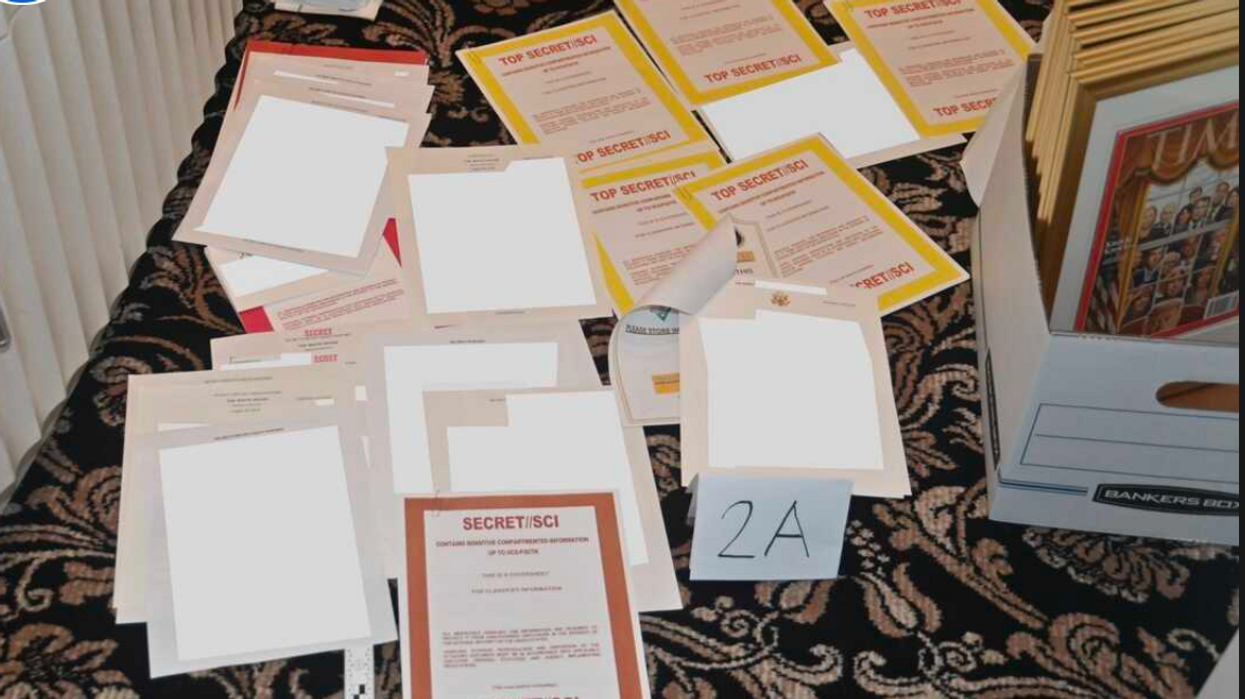Trump Demands Taxpayers Cover Costs Of Special Master Document Review

Classified documents found in Donald Trump's office at Mar-a-Lago
As the legal woes of former President Trump mount — the latest of which stem from his pillaging and stashing of classified government documents at his Florida home — his attorneys have demanded in court that another party cover half of their client’s legal fees: American taxpayers.
The former President, whom the Republican National Committee (RNC) reportedly informed last month that it would no longer cover his legal bills, has asked a judge he appointed to approve a scheme under which that the American people would foot his legal fees in the classified documents case.
Last week Trump-appointed U.S. District Judge Aileen Cannon granted Trump’s request to have an independent arbiter, otherwise known as a special master, sift through the trove of documents seized by FBI agents from Trump’s Mar-a-Lago resort last month, roughly 300 of which the Justice Department has said are classified.
In a joint filing Friday night, the Justice Department and Trump attorneys submitted dueling visions for the special master review process, most notably the arbiter’s pay.
A clause in the filing outlining Trump’s request to go dutch read, “Plaintiff [Donald Trump] proposes to split evenly the professional fees and expenses of the Special Master and any professionals, support staff, and expert consultants engaged at the Master’s request.”
However, the Justice Department, whose “filter team” had already set aside the documents subject to attorney-client privilege, disagreed with the request to go halves on the special master’s fees.
“The Government’s position is that, as the party requesting the special master, Plaintiff should bear the additional expense of the Special Master’s work,” the filing said.
The parties also disagreed on the special master’s duties and limitations. The former president asked that the special master review the over 11,000 seized documents, including those the FBI said bore “classified,” “secret,” and “top secret” markings.
The Justice Department, on the other hand, had demanded Thursday in a three-page notice of appeal that Cannon restore its access to the classified documents seized, or it would appeal her ruling to a higher court, saying that her ruling “could impede efforts to identify the existence of any additional classified records that are not being properly stored.”
Even if Trump sought to use the executive privilege assertion to exclude the classified material from the seized tranche of documents, the Justice Department said, he could not claim “possessory interest” — a legal standard that denotes a party’s right of ownership over an item — for secret documents that belong to the United States.
The former president “does not and could not assert that he owns or has any possessory interest in classified records; that he has any right to have those government records returned to him; or that he can advance any plausible claims of attorney-client privilege as to such records that would bar the government from reviewing or using them,” the department wrote.
The legal duel will continue Monday when Trump’s attorneys are expected to oppose the Justice Department’s demand that the documents bearing classified markings be exempt from the special master’s purview.
- FBI's Mar-a-Lago Inventory Shows 88 Empty Folders For Classified ... ›
- Right-Wing Attacks On Mar-a-Lago Search Are Not Aging Well ... ›
- Trump Compares FBI Raid On Mar-a-Lago to Watergate - National ... ›
- FBI Sought Highly Classified Nuclear Weapons Data In Mar-a-Lago ... ›
- Trump Supporters Threatening 'Civil War' Over Mar-a-Lago Raid ... ›
- Former FBI Agents: Mar-a-Lago Raid Is 'A National Security Issue ... ›
- Report: FBI Searched Classified Nuclear Weapons Documents At ... ›
- Trump Lawyers Refuse Special Master Order On Documents He 'Declassified' - National Memo ›
- Trump's Big Day With Special Master Doesn't Go Well (For Him) - National Memo ›








